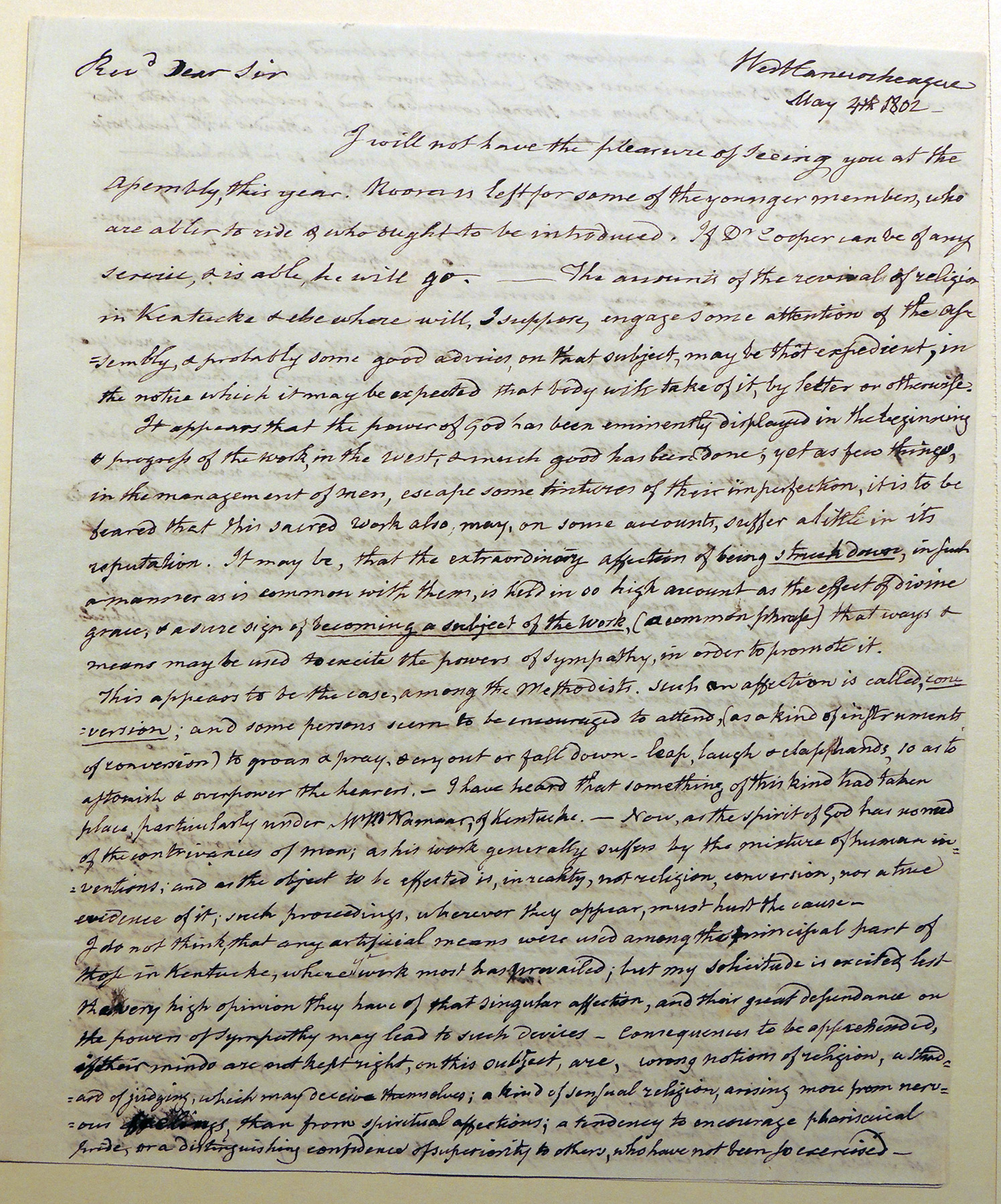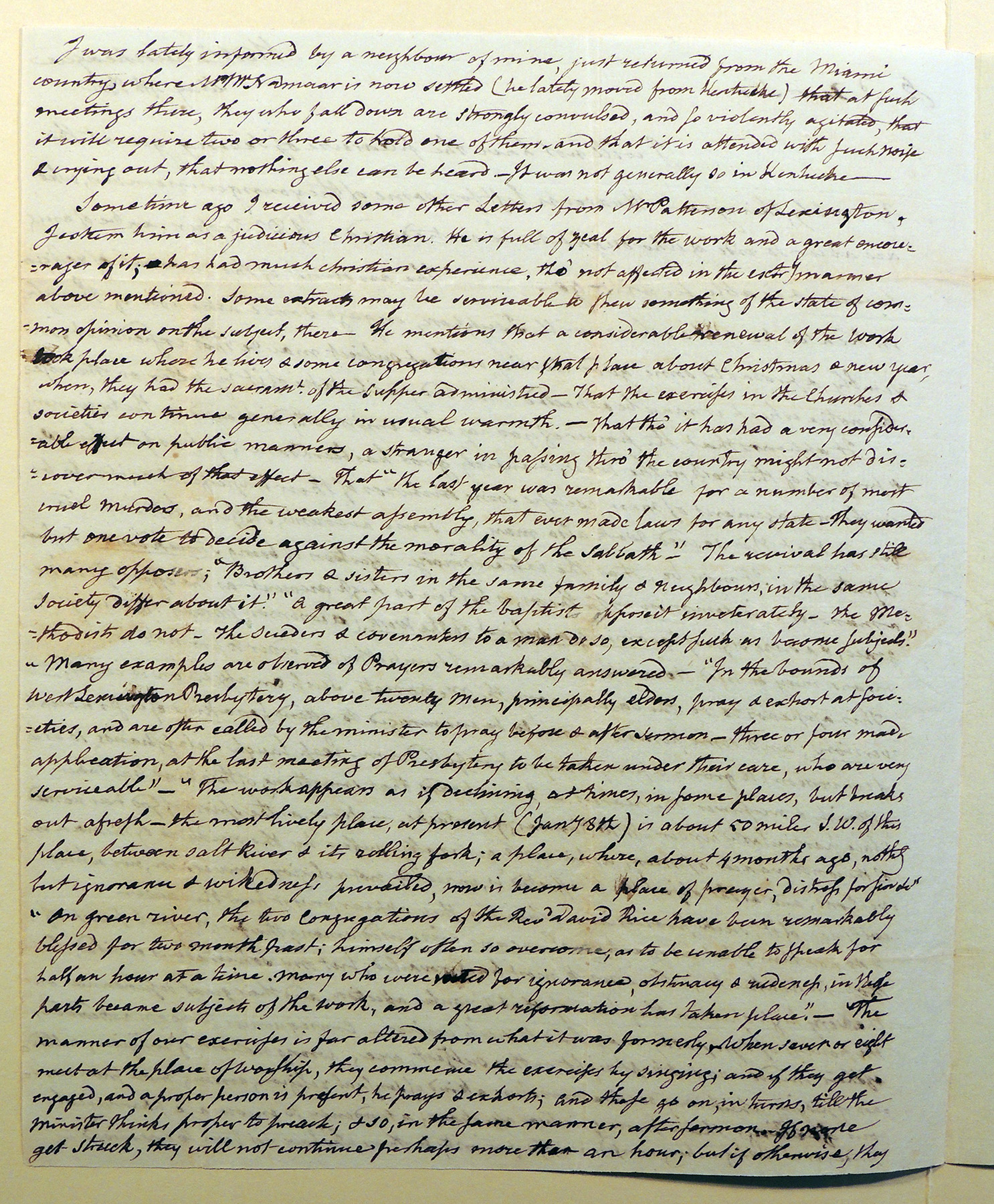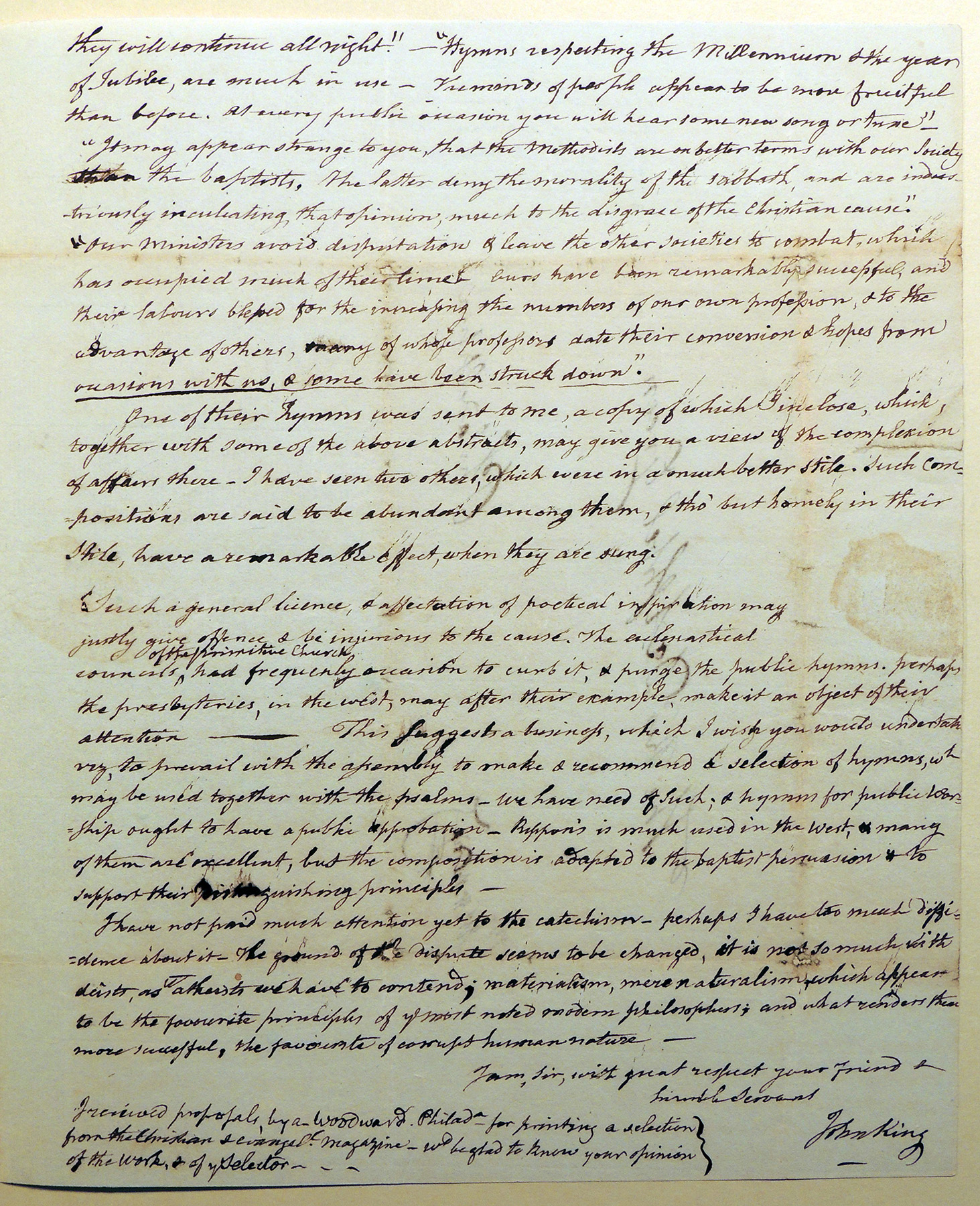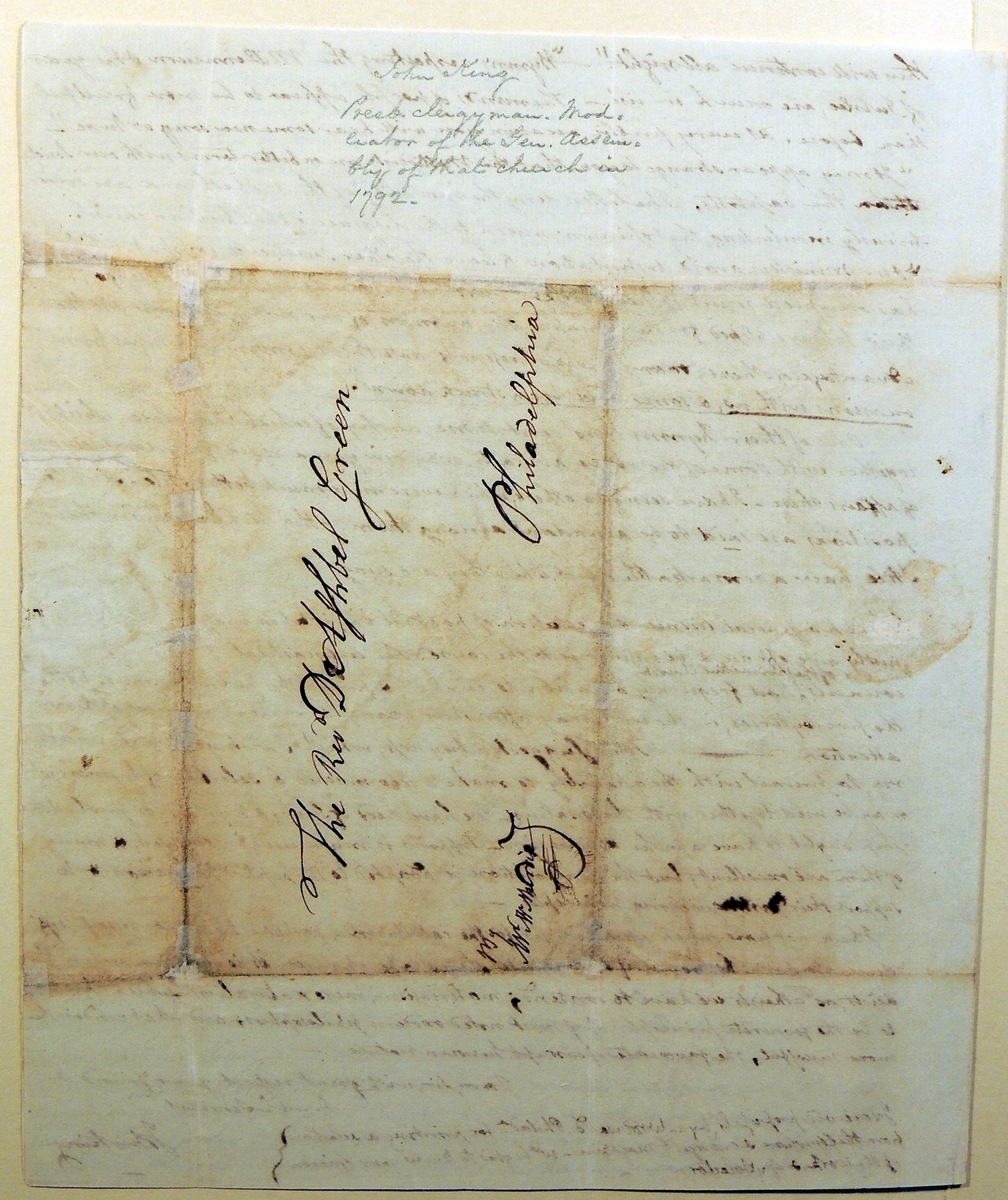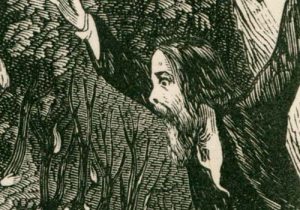In this important early revival letter, Presbyterian minister John King warns a colleague in Philadelphia of “tinctures” of “imperfection” emerging in the proliferating somatic exercises of the Great Revival. King’s description of convulsions and bodily agitations erupting among Richard McNemar’s parishioners at Turtle Creek, Ohio, is the first recorded evidence of jerking among the zealous New Light congregation that would become the seat of western Shakerism.
West Canuocheague
May 4th 1802
Reverend Dear Sir,
I will not have the pleasure of Seeing you at the Assembly this year. Room is left for some of the young members, who are abler to ride & who ought to be introduced. If Dr. Cooper can be of any service, & is able he will go.
The accounts of the revival of religion in Kentucke & elsewhere will, I suppose, engage some attention of the Assembly, & probably some good [advices] on that subject, may be tho’t expedient, in the notice which it may be expected that body will take it, by letter or otherwise.
It appears that the power of God has been eminently displayed in the beginning & progress of the work, in the west, & much good has been done; yet as few things, in the management of men, escape some tinctures of their imperfection, it is to be feared that this sacred work also may, on some accounts, suffer a little in its reputation. It may be, that the extraordinary affection of being struck down, in such a manner as is common with them, is held in so high account as the effect of divine grace, & a sure sign of becoming a subject of the work, (a common phrase) that ways & means may be used to excite the powers of sympathy, in order to promote it.
This appears to be the case, among the Methodists. Such an affection is called, conversion; and some persons seem to be encouraged to attend, (as a kind of instrument of conversion) to groan & pray, & cry out or fall down, leap, laugh & clap hands, so as to astonish & overpower the hearers. I have heard that something of this kind had taken place, particularly under Mr. McNamaar, of Kentucke. Now, as the spirit of God has no need of the contrivances of man; as his work generally suffers by the mixture of human inventions; and as the object to be effected is, in reality, not religion, conversion, nor a true evidence of it; such proceedings, whenever they appear, must hurt the cause.
I do not think, that any artificial means were used among the principal part of those in Kentucke, where the work most has prevailed; but my solicitude is excited lest the very high opinion they have of that singular affection, and their great dependance on the powers of sympathy may lead to such devices. Consequences to be apprehended, if their minds are not kept right, on this subject, are, wrong notions of religion, a standard of judging, which may deceive themselves; a kind of sensual religion, arising more from nervous [feelings] than from spiritual affections; a tendency to encourage pharisaical pride, or a distinguishing confidence of superiority to others, who have not been so exercised.
I was lately informed by a neighbour of mine, just returned from the Miami country, where Mr. McNamaar is now settled (he lately moved from Kentucke) that at such meetings there, they who fall down are strongly convulsed, and so violently agitated, that it will require two or three to hold one of them, and that it is attended with such noise & crying out, that nothing else can be heard. It was not generally so in Kentucke.
Some time ago I received some other Letters from Mr. Patterson of Lexington. I esteem him as a judicious Christian. He is full of zeal for the work and a greater encourager of it, has had much christian experience, tho’ not affected in the [extraordinary] manner above mentioned. Some extracts may be serviceable to shew something of the state of common opinion on the subject, there. He mentions that a considerable renewal of the work took place where he lives & some congregations near that place about Christmas a new year, when, they had sacrament of the Supper administred. That the exercises of the Churches & societies continue generally in usual warmth. That tho’ it has had a very considerable effect on public manners, a stranger in passing thro’ the country might not discover much of that effect. That “the last year was remarkable for a number of most cruel murders, and the weakest assembly, that ever made laws for any state. They wanted but one vote to decide against the morality of the Sabbath.” The revival has still many oppsers; “Brothers & sisters in the same family & neighbours, in the same Society differ about it.” “A great part of the Baptists oppose it inveterately. The Methodists do not. The Seceders & covenanters to a man do so, except such as become subjects.” “Many examples are observed of Prayers remarkably answered.” “In the bounds of West Lexington Presbytery, above twenty men, principally elders, pray & exhort at societies, and are often called by the minister to pray before & after sermon. Three or four made application, at the last meeting of Presbytery to be taken under their care, who are very serviceable.” “The work appears as if declining at times, in some places, but breaks out afresh. The most lively place, at present (January 8th) is about 50 miles S.W. of this place, between Salt River & its Rolling Fork; a place where, about 4 months ago, nothing but ignorance & wickedness prevailed, now is become a place of prayer, distress for sin &c.” “On Green River, the two Congregations of Reverend David Rice have been remarkably blessed for two months past; himself often so overcome, as to be unable to speak for half an hour at a time. Many who were noted for ignorance, obstinacy & rudeness, in these parts became subjects of the work, and a great reformation has taken place.” “The manner of our exercises is far altered from what it was formerly. When seven or eight meet at the place of worship, they commence the exercises by singing; and if they get engaged, and a proper person is present, he prays & exhorts; and those go on, in turns, till the minister thinks proper to speak; & so, in the same manner, after sermon. If some get struck, they will not continue perhaps more than an hour; but if otherwise, they will continue all night!” “Hymns respecting the Millennium & the year of Jubliee, are much in use. The minds of people appear to be more fruitful than before. At every public occasion you will hear some new song or tune.” “It may appear strange to you, that the Methodists are on better terms with our Society than the Baptists. The latter deny the morality of the sabbath, and are industriously inculcating that opinion, much to the disgrace of the Christian cause.” “Our Ministers avoid disputation & leave the other societies to combat, which has occupied much of their time. Ours have been remarkably successful, and their labours blessed for the increasing the members of our own profession, & to the advantage of others, many of whose professors date their conversion & hopes from occasions with us, & some have been struck down.”
One of their hymns was sent to me, a copy of which I inclose, which, together with some of the above abstracts, may give you a view of the complexion of affairs there. I have seen two others, which were in a much better stile. Such compositions are said to be abundant among them, & tho’ but homely in their Stile, have a remarkably effect, when they are sung.
Such a general license, & affectation of poetical inspiration may justly give offence & be injurious to the cause. The ecclesiastical councils of the primitive Church had frequently occasion to curb it, & purge the public hymns. Perhaps the presbyteries, in the west, may after their example make it an object of their attention. This suggests a business, which I wish you would undertake, viz. to prevail with the assembly to make & recommend a selection of hymns, which may be used together with the psalms. We have need of Such; & hymns for public Worship ought to have a public approbation. [Risspon’s] is much used in the West, & many of them are excellent, but the composition is adapted to the Baptist persuasion & to support their distinguishing principles.
I have not paid much attention to the catechism. Perhaps I have too much diffidence about it. The ground of the dispute seems to be changed, it is not so much with deists, as with atheists we have to contend; materialism, mere naturalism, which appears to be the favourite principles of the most noted modern philosophers; and what renders them more successful, the favourite of corrupt human nature.
I am, Sir, with great respect your friend & humble Servant
John King
I received proposals, by a Woodward Philadelphia for printing a selection from the Christian & evangelical Magazine. Would be glad to know your opinion of the Work, & of the Selector.
[Addressed:] The Reverend Dr. Ashbel Green Philadelphia By Mr. McMurdig
Source
John King to Ashbel Green, May 4, 1802, case 8, box 37, Simon Gratz Autograph Collection, 1343–1928, Collection 0250A, Historical Society of Pennsylvania, Philadelphia.
